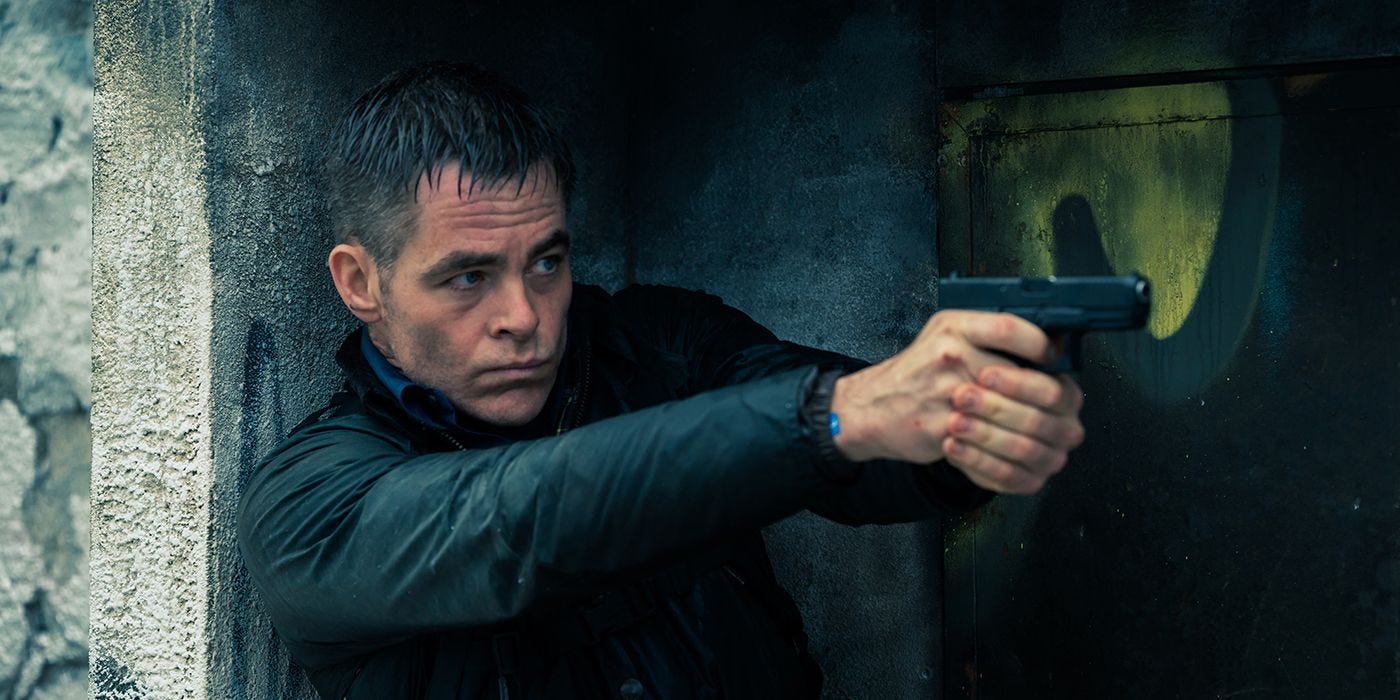In Review: 'Apollo 10 1/2,' 'Morbius,' 'Nitram,' 'The Contractor'
Richard Linklater rotoscopes his memories of growing up in a NASA bubble and a Spider-Man-adjacent character gets his own movie. Plus brief reviews of new films from Justin Kurzel and Chris Pine.
Apollo 10 1/2: A Space Age Childhood
Dir. Richard Linklater
98 min.
Time and memory are the prevailing themes of Richard Linklater’s career. Sometimes those themes are explicit, like in the bittersweet nostalgia of Dazed and Confused, the romantic arc of “The Before Trilogy,” or the multi-year experiment that created Boyhood. Yet they’re implied, too, by his choices and curiosity, as he’s wended through Hollywood and independent circles, fiddled with different genres and mediums, and forged an iconoclastic career path that itself feels like a stream of consciousness, rather than the result of fussy calculation. Every once in a while, he’ll make a film like Slacker or Waking Life that presses pause on traditional narrative movement and acts more as a repository for philosophical ideas, conspiracy theories, or keep-Austin-weird eccentricity.
Linklater’s delightful new animated film for Netflix, Apollo 10 1/2: A Space Age Childhood, falls roughly into that category, though it could have been called Boyhood if the title wasn’t already taken. There’s a fanciful story here about a 10-year-old from a Houston suburb in the late 1960s who makes his way onto a NASA capsule, but it exists mostly as the propulsion that guides this rich semi-autobiographical reverie from beginning to end. Apollo 10 1/2 aims to float around at zero gravity, taking in as much of an era as possible, getting lost in details both trivial and profound. Linklater evokes a childhood lived in close proximity to mankind’s great intergalactic dreams, which only naturally bled into his own waking life.
As with Waking Life and A Scanner, Darkly, Linklater deploys the Rotoscope style of animating over live-action footage, though the look here is more stabilized than the earlier entries’ shimmering jankiness—which, it should be said, was more asset than liability. Opening with a game of elementary-school kickball in the spring of 1969, Apollo 10 1/2 announces its intentions immediately by delving into the nuances of the sport. If the gym teacher catches a kid violating the oft-defied rule to not peg runners with the ball, he’d force the offender to stand against a brick wall with his nose in a freshly chalked circle. (Repeat offenders would know to manipulate their stance in order for the circle to get drawn in a more comfortable spot. That sort of commitment to granular detail defines the film.)
The young man doing the remembering here is Stan, whose thoughts are narrated by Jack Black, whose collaborations with Linklater on School of Rock and Bernie are arguably the two best roles of his career. Black’s comic voice sets the tone, which oscillates between Stan’s real life as one of six children growing up in a middle-class suburban home and his fantasy life as a hand-picked astronaut-in-training. With NASA ramping up the space race against the Soviets, two government agents take him aside for a proposal: Would he, an untrained child of middling academic achievement, like to fly on the first manned mission to the moon? It turns out that NASA made the capsule too small for a grown-up. D’oh!
Stan heads over to NASA headquarters nearby for training, but the film spends only a minimal amount of time on his fantasies of flight. Linklater has other, more important items on the agenda: How to make a profit on an afternoon playing pinball and drinking RC cola; how to make music on the new push-button phones; what the graphics were like on the cutting-edge display at the new Astrodome; how the subdivisions sprouting all over the area flooded constantly due to drainage issues; how his mom could stretch one canned ham into an entire week of ham-related dinners; how his sisters used concentrated orange juice cans as makeshift curlers. The list of memories goes on and on—describing what was on TV gobbles up plenty of running time on its own—and the cumulative effect is to paint a vivid and frequently hilarious scrapbook of this specific time and place.
One of the persistent criticisms of Boyhood is that the boyhood it described—that of a white kid from Austin—didn’t jibe with experiences of those from different racial and social backgrounds. At the time, it seemed like an attack on the title, not unlike the criticisms directed at documentary American Teen, which focused exclusively on white high-schoolers from Warsaw, Indiana. But Linklater seems to have taken that into account with Apollo 10 1/2, which acknowledges the strange bubble that Stan and his family occupied in the summer of 1969. He looks back warmly on a cloistered childhood, knowing the atomic-age fantasies of his youth were insulated from the strife he only experienced through a Walter Cronkite broadcast. Young Stan would have to wait for his consciousness to elevate. — Scott Tobias
Morbius
Dir. Daniel Espinosa
104 min.
Pity poor Dr. Michael Morbius, a tireless scientist driven to make the world a better place in spite of the rare blood disorder that makes him too frail to walk without great effort and the assistance of braces and leaves him with the exhausted expression of a man who hasn’t spent more than a few hours in bed at a time for years. Something of a medical celebrity, he’s a man of such high standards that he rejects a Nobel Prize (after, for some reason, flying all the way to Sweden to turn it down at the ceremony itself). He’ll do anything to expand the boundaries of knowledge, be it journeying into the mountains to study/be attacked by vampire bats or experimenting on himself (in international waters because of the legal implications) with a serum derived from said bats. If he tries the serum out too soon, without fully testing it first, that’s because science can’t wait, even if it means accidentally turning himself into a blood-seeking animal human-hybrid — a kind of “bat-man,” if you will.
More tragic figure than traditional superhero, Morbius the Living Vampire has been hanging around Marvel Comics since the early 1970s, when the loosening of the Comics Code Authority reopened the floodgates for vampires and other horror characters that had been banned since the moral panic that consumed comic book industry in the 1950s. A weird character from the Marvel fringes, Morbius never seemed like a prime candidate to anchor a movie (and, the studio hopes, a series of movies with crossovers and tie-ins) but, hey, neither did the Guardians of the Galaxy. If the movie’s good, that history doesn’t matter.
Morbius, directed by Daniel Espinosa (Life) and starring Jared Leto, is not a good movie. But that might not matter. Like the Venom films, it focuses on one of the Spider-Man adjacent characters to which the studio has the rights. With those rights (but, so far, without a Spider-Man), it’s attempting to build a comic book universe all its own, and as a cog in that franchise-stoking machine, Morbius is functional. We get to meet Michael Morbius (first as a brilliant child), witness the origin of his vampiric powers, watch him do battle with Milo (Matt Smith), a similarly afflicted friend-turned-archenemy, then hang around to see what future storylines the credits set up.
It all barely hangs together as a story. (And seems to be a much different story than the one promised by the trailer.) Leto delivers an uncharacteristically dull performance that, to be fair, perfectly suits the film. (Only Al Madigral breathes life into his scenes as a wisecracking FBI agent.) And the climax devolves into a headache-inducing barrage of blurry CGI nonsense, the solution of choice to films attempting to pound audiences into submission. (See also: the first Suicide Squad, and the Dark Universe version of The Mummy.) But Morbius at least gets the business of franchise-extending done. It’s a box checked off. But is it really a movie? —Keith Phipps
In Brief
In late April 1996, Martin Bryant, then a 28-year-old from Port Arthur, Tasmania, went on a shooting spree that killed 35 people and injured another 23, then and now one of the deadliest on record. The case became famous internationally for the quickness with which the Australian government came together on sweeping gun control legislation, but such restrictions in the country have slackened over the years. Justin Kurzel’s Nitram feels like a gut-punch reminder of why lawmakers must strive to keep people like Bryant from getting a gun, though it’s only in the closing titles that the film’s politics are made explicit. Until then, the events leading up to the shooting get presented with more of a sickening inevitability, like the slow flicking of the safety on a rifle.
Caleb Landry Jones won the Best Actor prize at Cannes for playing “Nitram” (“Martin” spelled backwards), an intellectually disabled misfit with long, unruly blond hair, grimy clothes, and a predilection for firecrackers. His father (Anthony LaPaglia), a salesman, nurses a severe depression that Nitram has inherited and his chain-smoking mother (an excellent Judy Davis) seems too overwhelmed to carry their psychological baggage. Befriending a Miss Havisham-type (Essie Davis) gives him access to money and a living space where no one can check his behavior. The public taste for detailing the lives and motives of mass shooters has dwindled lately, as doing so tends to anonymize the victims that much more. But Kurzel, who directed the robustly stylized Macbeth in 2015, maps out an exceptionally sad and convincing path to the incident, leaning on Jones’ brute physicality and childlike emotional swings to suggest that Martin/Nitram acted on a narrowing set of options. One of those options—dependent on easy access to multiple firearms—could have been taken away. —Scott Tobias
The Contractor is about an involuntarily discharged special forces sergeant (Chris Pine) who agrees to private contract work to support his family, only to discover the work is shadier than advertised, leaving him vulnerable to attack, not to mention the demands of his conscience. A healthy country would make a thriller that questions a system that allows mercenaries to fight overseas with maximum firepower and limited accountability. In the country that produced The Contractor, however, the filmmakers exploit the premise only insofar as it can take a paint-by-number action thriller with debts to The Bourne Identity and the Rambo movies. At one point, the head of a mercenary outfit tumbles about “that soulless fuck Erik Prince,” the real-life founder of Blackwater, one of the oiliest villains of our time. Lucky for Prince, movies like The Contractor are happy to let him and his practices and worldview off the hook, for fear of getting too political. —Scott Tobias













Love that Apollo 10 1/2 review, especially that last graf about how Linklater may be answering those who critiqued Boyhood based on the title without being overly defensive.
The Contractor's great not for the film content but because the financiers are doing a legit The Producers-esque scheme involving a merger, undoing the same merger, declaring bankruptcy every month and still promising/threatening to give us the sequel to Gerard Butler's Greenland.